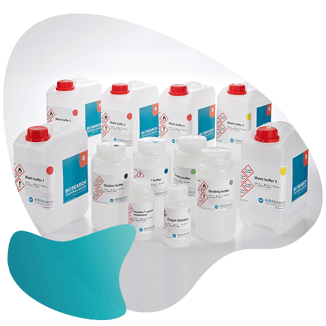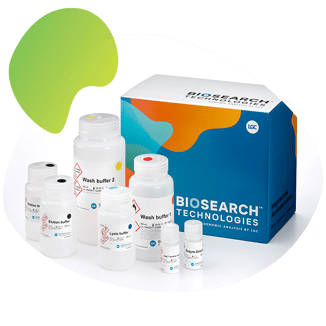Originally published : Fri, October 7, 2022 @ 11:25 AM
Updated : Tue, May 9, 2023 @ 11:05 AM
Molecular testing protocols for pathogen detection and diagnosing human diseases require reliable and high-quality isolation of genetic material from diverse sample types. There are many extraction and purification technologies available and choosing the right one for your needs requires some planning and evaluation. Before deciding which isolation method best suits your needs, you may wish to consider the following:
Sample type

The sample you will be isolating nucleic acids from can help narrow down your extraction options. For example, some isolation methods may be suitable for extracting nucleic acids from blood, while others are not. Challenging sample types may require more intensive purification methods to meet downstream objectives. The ultimate goal is to obtain sufficient high-quality genetic material which is free of contaminants, such as proteins, cellular components and unwanted nucleic acids, that may interfere with the downstream application to ensure consistent high-quality diagnostic results.
Nucleic acid type and quality
As you’re evaluating isolation methods, be sure to choose one compatible with the type of nucleic acid you’re working with. RNA isolation is often more difficult because ribonuclease enzymes, abundant in human cells and tissues, degrade RNA quickly. RNA extraction requires additional techniques to neutralise ribonucleases for effective downstream analysis.
It’s also imperative to choose an isolation method that delivers the quality of nucleic acid you expect. Some purification techniques allow you to obtain very pure nucleic acids required for NGS or cloning, while other extraction options are better suited for PCR-based technologies only.
Downstream applications
The downstream application can help you decide which isolation methods suit your goals. Isolation methods that use magnetic particles to remove impurities may recover higher quality nucleic acids compared to certain solution-based isolation technologies. Choosing an extraction technology that delivers the highest quality nucleic acid for your molecular analysis requirements will help to optimise performance and eventually cost-effectiveness of your assays.
Automation potential
Select a nucleic acid isolation method that works with your planned workflow. Some technologies are fully automated and require fewer manual steps, while others may be more time-consuming with the addition of manual pipetting, centrifugation or heating.
Throughput and scalability
Some nucleic acid isolation methods enable thousands of sample extractions daily, while others support only hundreds. Match your projected sample numbers with an appropriate extraction method to avoid bottlenecks in your workflow. It’s also important to consider the scalability potential of your nucleic acid isolation method to meet future testing demands.
Technology
There are several different nucleic acid technologies, ranging from magnetic particles to precipitation and column-based methods. Each technology offers benefits and limitations and will require different lab resources to execute. Compare these options based on cost, throughput and compatibility with downstream molecular analysis applications.
Solutions to match diverse needs
LGC Biosearch Technologies’ experts are on hand to help you find the most suitable nucleic acid isolation method for your needs, with a portfolio that allows you to flex and scale providing you with the quality and quantity you require. Here is an overview of our most popular extraction and purification offerings.
sbeadex™ 
If you are looking for a purification method that will give you the highest nucleic acid quality possible, sbeadex is the best option. It is reliable for all applications, including PCR and NGS.
You can select sbeadex magnetic bead chemistry for nucleic acid isolation from forensic, blood, plant, livestock and other sample types. Advantages include:
- Versatility – High nucleic acid quality for all downstream applications, including PCR/qPCR and NGS.
- Fast, convenient and reproducible protocols that are easily adaptable to different sample types and workflows.
- Easy automation, ideal for high-throughput and compatible with most popular robotic platforms, including the Kingfisher™ and our oKtopure™ instrument.
- Greater efficiencies requiring no organic extraction and alcohol precipitation/washes - thus reducing inhibitors of enzymatic downstream applications.
- Ready-to-use kits with high stability (customisation is also readily available).
Our sbeadex Pathogen Nucleic Acid Purification Kit has been designed for purifying RNA and DNA from viral, bacterial and yeast pathogens, including SARS-CoV-2, CMV, RSV and influenza, among others. It provides high-quality nucleic acids for increased analytical sensitivity and a fast (25 or 45 minutes) protocol for high throughput.
The sbeadex blood kits are available specifically for purifying DNA from different blood preparations, including EDTA blood, Heparin blood, citrate blood and buffy coat samples.
Ideal for: Fully automatable, highest-quality nucleic acid purification
QuickExtract™
If your downstream molecular analysis includes PCR, our QuickExtract solution could help you streamline extraction workflows and increase efficiencies.
QuickExtract is an optimised blend of reagents designed to extract nucleic acids for PCR applications without further purification steps. It is compatible with a broad range of sample types, from swabs to hair follicles to cultured cells, and does not use any hazardous chemicals such as phenol, chloroform or guanidinium salts.
QuickExtract is a single-tube, approximately 8-minute protocol that is automation-compatible and results in PCR-ready DNA.
Ideal for: Simple, rapid nucleic acid extraction for PCR/RT-PCR
mag™

Our mag kits are a high-throughput and cost-effective DNA isolation method suitable for PCR, sequencing and genotyping. Like sbeadex, mag uses coated magnetic beads to bind DNA but uses, in contrast to sbeadex, conventional salt and alcohol-based wash buffers to remove contaminants before the final elution step.
mag DNA isolation kits are compatible with many sample types, including blood and saliva, hair, amniotic fluid, and tissue, among others. They can be easily integrated into common magnetic bead-based workflows.
Ideal for: Fully automatable high-quality nucleic acid purification
Kleargene™ spin
Kleargene spin technology enables simple, rapid DNA extraction and purification from tissue, blood and saliva samples.
This method was developed to address a challenge faced by many genomics services laboratories of achieving high throughput extraction of high-quality DNA sufficient for SNP genotyping.
The method is based on detergent-driven cell lysis, which is followed by guanidinium isothiocyanate-mediated DNA binding to glass fibre membranes. Washing removes contaminants, and DNA is then eluted into a low salt buffer. The entire process is carried out in one well per sample, and it is possible to extract a full 96-well plate in under an hour.
Ideal for: High-throughput, cost-effective DNA isolation
MasterPure™
MasterPure™ Complete DNA and RNA Purification Kits generate high yields of genomic DNA, total cellular DNA or total nucleic acids (TNA) in under 60 minutes from a variety of sample types. The technology is solution-based and may be scaled up or down as needed to deliver high-quality, high molecular weight genomic DNA or RNA for use in various applications, including sequencing/NGS.
Ideal for: High yields of high-quality nucleic acids from various sample types
Talk to one of our scientists
Isolating high-quality nucleic acids is a critical first step in obtaining reliable data for diagnosing human diseases. Our scientists are experts in all scales of extraction/purification methods and can advise you on which isolation method best fits your needs and how to optimise your protocol/workflow. In addition, we can also offer flexible customised and bulk solutions. Get in touch today and don’t forget to look through our comprehensive FAQs section for more information.
Additional resources
INFOGRAPHIC (PDF)
8 key considerations for selecting the best isolation technology for your project
Download this application note (created in partnership with Select Science) to help you choose an optimal kit best suited to your sample type and downstream requirements.

